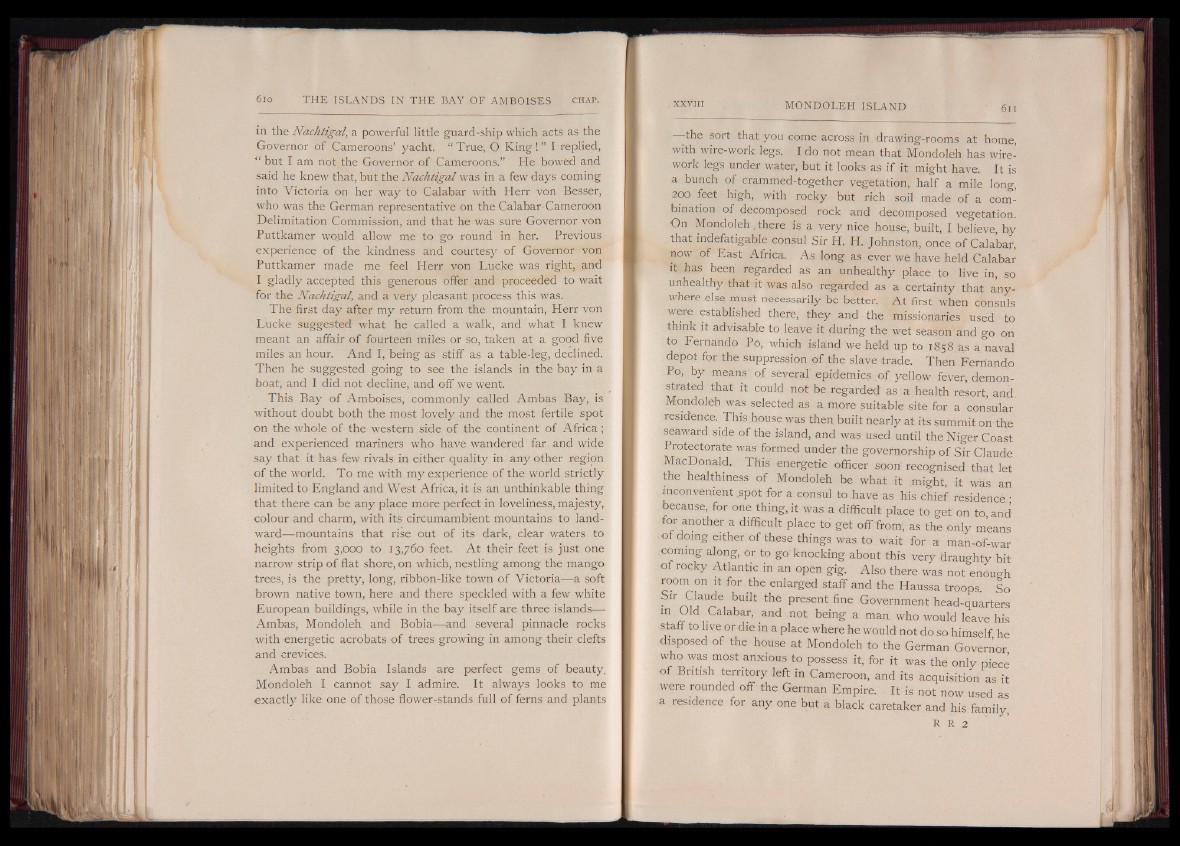
in the Nachtigal, a powerful little guard-ship which acts as the
Governor of Cameroons’ yacht. “ True, O K in g !” I replied,
“ but I am not the Governor of Cameroons.” He bowed and
said he knew that, but the Nachtigal was in a few days coming
into Victoria on her way to Calabar with Herr von Besser,
who was the German representative on the Calabar- Cameroon
Delimitation Commission, and that he was sure Governor von
Puttkamer would allow me to go round in her. Previous
experience of the kindness and courtesy of Governor von
Puttkamer made me feel Herr von Lucke was right, and
I gladly accepted this generous offer and proceeded to wait
for the Nachtigal, and a very pleasant process this was.
The first day after my return from the mountain, Herr von
Lucke suggested what he called a walk, and what I knew
meant an affair of fourteen miles or so, taken at a good five
miles an hour. And I, being as stiff as a table-leg, declined.
Then he suggested going to see the islands in the bay in a
boat, and I did not decline, and off we went.
This Bay of Amboises, commonly called Ambas Bay, is
without doubt both the most lovely and the most fertile spot
on the whole of the western side of the continent of Africa ;
and experienced mariners who have wandered far and wide
say that it has few rivals in either quality in any other region
of the world. To me with my experience of the world strictly
limited to England and West Africa, it is an unthinkable thing
that there can be any place more perfect in loveliness, majesty,
colour and charm, with its circumambient mountains to landward—
mountains that rise out of its dark, clear waters to
heights from 3,000 to 13,760 feet. A t their feet is just one
narrow strip of flat shore, on which, nestling among the mango
trees, is the pretty, long, ribbon-like town of Victoria— a soft
brown native town, here and there speckled with a few white
European buildings, while in the bay itself are three islands—
Ambas, Mondoleh and Bobia— and several pinnacle rocks
with energetic acrobats of trees growing in among their clefts
and crevices.
Ambas and Bobia Islands are perfect gems of beauty.
Mondoleh I cannot say I admire. It always looks to me
exactly like one of those flower-stands full of ferns and plants
the sort that you come across in drawing-rooms at home,
with wire-work legs, I do not mean that Mondoleh has wire-
work legs under water, but it looks as if it might have. It is
a bunch of crammed-together vegetation, half a mile long,
200 feet high, with rocky but rich soil made of a combination
of decomposed rock and decomposed vegetation.
On Mondoleh,there is a very nice house, built, I believe, by
that indefatigable consul Sir H. H. Johnston, once of Calabar,
now of East Africa. As long as ever we have held Calabar
it has been regarded as an unhealthy place to live in, so
unhealthy that it was also regarded as a certainty that anywhere
else must necessarily be better. A t first when consuls
were established there, they and the missionaries used to
think it advisable to leave it during the wet season and go op
to Fernando Po, which island we held up to 1858 as a naval
depot for the suppression of the slave trade. Then Fernando
Po, by means' of several epidemics of yellow fever, demonstrated
that it could not be regarded as a health resort, and.
Mondoleh was selected as a more suitable site for a consular
residence. This house was then built nearly at its summit on the
seaward side of the island, and was used until the Niger Coast
Protectorate was formed under the governorship of Sir Claude
MacDonald. This energetic officer soon recognised that let
the healthiness of Mondoleh be what it .might, it was an
inconvenient spot for a consul to have as his chief residence •
because, for one thing, it was a difficult place to get on to and
for another a difficult place to get off from; as the only means
o f doing either of these things was to wait for a man-of-war
coming along, or to go knocking about this very draughty bit
o f rocky Atlantic in an open gig. Also there was not enough
room on it for the enlarged staff and the Haussa troops. So
Sir Claude built the present fine Government head-quarters
m ^ r r> and n0t bdng a man who would leave his
staff to live or die in a place where he would not do so himself he
disposed of the house at Mondoleh to the German Governor
who was most anxious to possess it, for it was the only piece
o f British territory left in Cameroon, and its acquisition as it
were rounded off the German Empire. . It is not now used as
a residence for any one but a black caretaker and his family,